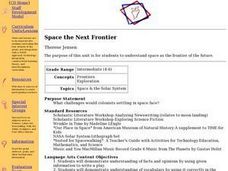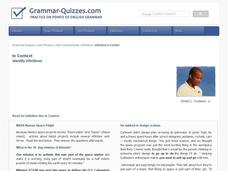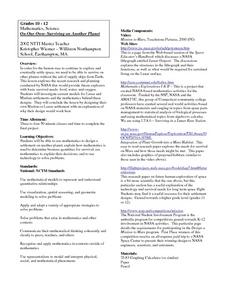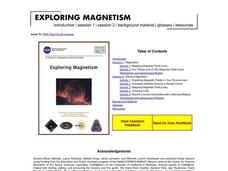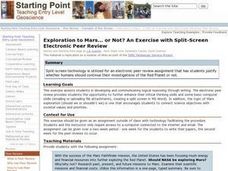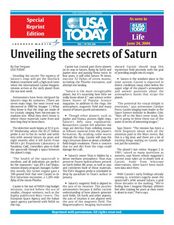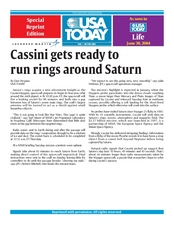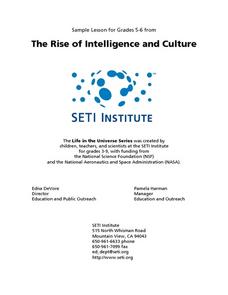Curated OER
Space the Next Frontier
Students examine the use of space as the frontier of the future. Using the colonist's experience coming to the New World, they identify challenges they would face if they were to settle in space. As a class, they share what they already...
Curated OER
Using Infinitives In Context
In this using infinitives in context learning exercise, students read an article containing infinitives, then interactively complete 8 sentences with immediate online feedback.
Curated OER
Discovery Shuttle Ready for Liftoff
Students investigate and research what the space shuttle and ground crews must do to make sure all goes well from liftoff to landing each time the shuttle leaves earth.
Curated OER
Look at those Leaves!
Students observe and measure tree leaves. In this leaf lesson students do on a "leaf walk" then use the leaves they find to complete a few activities.
Curated OER
Sensing the Invisible
Students study visible light and explain why we want to use infrared radiation to study Mercury. In this sunlight instructional activity students construct a device to measure the presence of infrared radiation in sunlight.
Curated OER
Aerospace Industry: Vocabulary Skills
In this online interactive vocabulary skills instructional activity, students answer 10 fill in the blank questions regarding words related to the aerospace industry. Students may submit their answers to be scored.
Curated OER
On Our Own- Surviving on Another Planet
Students investigate current models for Lunar and Martian settlements and study the mathematics behind these designs. They design their own Lunar or Martian settlement with an explanation of why their model would work best.
Curated OER
People and Space
Students eat dehydrated foods that the astronauts would eat in space. In this dehydrated foods lesson plan, students make lists of food they could eat, discuss how dehydration takes place, eat food, and complete discussion questions.
Curated OER
Upgrading Hubble
Students investigate the Hubble telescope's role in astrophysics research. They complete a Webquest, watch a video, view Hubble photographs, play online games, answer discussion questions, and evaluate newspaper articles about optics.
Curated OER
Exploring the Night Sky: Fall/Winter
Students explain how moon phases occur. They explain three ways that the night sky has been used through history. Students locate some of the constellations in the night sky. They discuss stories and myths surrounding stars.
Curated OER
Look At Those Leaves!
Students observe, measure and sort leaves. In this leaf lesson students divide into groups and observe the different kinds of leaves.
Curated OER
Life on Other Planets
In this planets worksheet, students put the planets in order, complete sentences about planets, read text about planets, match sentences, and more. Students complete 7 tasks total.
Curated OER
Lunar Field Trip
Students take a virtual tour on Google Moon of what human life would be like on the moon. In this moon lesson plan, students also compose web diagrams, make charts, make a time line, investigate problems, and more.
Curated OER
Exploring The Neighborhood of the Solar System
Pupils explain why exploring the universe for life on other planets is an important field of study. They use mathematical formulas to calculate the temperatures of planets as it relates to their distance from the sun. Students use this...
Curated OER
Exploring Magnetism
Pupils participate in several activities that allow them to better understand magnetism. For this exploratory lesson students take part in different activities to help them to better understand magnetic fields, circuits and...
Curated OER
What's Out There? Space Shuttle Exploration and Simulation
Students role-play the jobs of space shuttle astronauts, conduct experiments, and research space using the Internet and offline experiments. Student-astronauts hold a "press conference" to share their information with others in a...
Curated OER
Exploration to Mars... or Not? An Exercise with Split-Screen Electronic Peer Review
Students use split-screen technology which is utilized for an electronic peer review assignment that has students justify whether humans should continue their investigations of the Red Planet or not.
Curated OER
Studying Exothermic and Endothermic Reactions
Students explore the mesosphere and lower thermosphere globally and achieve a major improvement in our understanding of the fundamental processes governing the energetics, chemistry, dynamics, and transport of the atmospheric region....
Curated OER
Using the Internet
In this using the internet worksheet, students search several websites to review information about the heart, human senses, the solar system, and planets. Students also read information about the rock cycle and answer provided questions.
Curated OER
Breaking News English: Shuttle Discovery Launches Successfully
In this English learning exercise, learners read "Shuttle Discovery Launches Successfully," and then respond to 47 fill in the blank, 7 short answer, 20 matching, and 8 true or false questions about the selection.
Curated OER
Unveiling the Secrets of Saturn
Students read and study an article then answer questions on Saturn. In this investigative lesson students identify ways space exploration has helped humanity and then they search the Internet for space pictures and sketch a drawing...
Curated OER
Cassini gets Ready to run Rings Around Saturn
Fourth graders study an article about Saturn. For this investigative lesson students discuss the article and complete an activity that asks them what question they would pose about Saturn.
Curated OER
Extraterrestrial Communication: Can We Talk to Anybody Out There?
Pupils examine the possibilities of communication with other living organisms within our solar system through research and hands on activities, as well as observing and analyzing teacher demonstrations.
Curated OER
Nutrition in Space
Students discover the importance of a healthy diet during space travel and examine the physiological changes astronauts experience while in space. In groups, they develop questions to determine an astronaut's food intake and identify...


